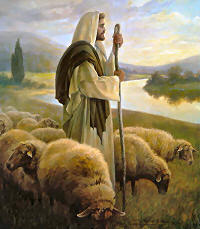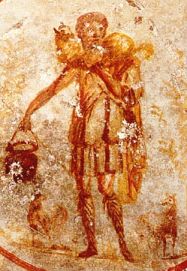
Daily Readings for: April 29, 2012
(Readings on USCCB website)
Collect: Almighty ever-living God, lead us to a share in the joys of heaven, so that the humble flock may reach where the brave Shepherd has gone before. Who lives and reigns with you in the unity of the Holy Spirit, one God, for ever and ever.
Easter: April 29th
Fourth Sunday of Easter Old Calendar: Third Sunday after Easter
I am the good shepherd. A good shepherd lays down his life for the sheep. A hired man, who is not a shepherd and whose sheep are not his own, sees a wolf coming and leaves the sheep and runs away, and the wolf catches and scatters them. This is because he works for pay and has no concern for the sheep. I am the good shepherd, and I know mine and mine know me, just as the Father knows me and I know the Father; and I will lay down my life for the sheep (Jn 10:11-15).
The Memorial of St. Catherine of Siena, normally celebrated today, is superseded by the Sunday liturgy.
Today is the Forty Ninth World Day of Prayer for Vocations. The theme of Benedict XVI's reflections this year is: "Vocations, the Gift of the Love of God".
Click here for commentary on the readings in the Extraordinary Form of the Roman Rite.
Sunday Readings
The first reading is taken from the Acts of the Apostles 4:8-12. This excerpt is a sequence of what was described in last Sunday's first reading. Peter had cured a cripple-from-birth and told the people that it was not by his own power that he did this, but through the power of Jesus of Nazareth, whom the Jews had crucified.
The second reading is from the first Letter of John 3:1-2 in which he sets out in a couple of sentences the basic effect of the Incarnation. Already in this life men are made children of God. Because we are God's children here below we shall see him as he is in the future life.
The Gospel is from St. John 10:11-18. The image of Christ as our Good Shepherd has always appealed to human nature. One of the earliest paintings of Christ in the Roman catacombs represents him as carrying an injured sheep on his shoulders. This is a manifestation of love which touches our innermost feelings. We do not mind being likened to sheep in this context. There is something guileless about a sheep, and at the same time a lot of foolishness. Does not this describe the vast majority of men, even many of those who openly oppose Christ? Is there not something very sheeplike about the man who, because God gave him a limited intellect, thinks he knows all things and needs no further help from God? The sheep who thinks it knows as much, and even more, than the shepherd and sets out to fend for itself, is no more foolish than the man who thinks he can do without God's revelation and God's Church.
 Indeed we all act like sheep on many occasions, when it comes to the things that concern our spiritual welfare. We often ramble off from the flock to nibble at little bits of forbidden pasture. However, we have a Shepherd who understands us, one whose patience and love are infinite. He is always ready to go after us when we stray too far; his voice is constantly reaching out to us in missions, retreats, sicknesses, crosses and other various ways. How many times have we already felt his loving grace calling and helping us back to the safety of his fold?
Indeed we all act like sheep on many occasions, when it comes to the things that concern our spiritual welfare. We often ramble off from the flock to nibble at little bits of forbidden pasture. However, we have a Shepherd who understands us, one whose patience and love are infinite. He is always ready to go after us when we stray too far; his voice is constantly reaching out to us in missions, retreats, sicknesses, crosses and other various ways. How many times have we already felt his loving grace calling and helping us back to the safety of his fold?
There are many who are not so fortunate as we, who either through no fault of their own or through their own fault do not hear his voice and do not know or follow him. This is an opportunity he gives us to show how we appreciate all he has done for us. He died on the cross for all men. He wills all men to profit by his death, and his statement "them also I must bring" is a direct appeal to us to cooperate with him in this work. Every Christian is a missionary. The very fact of living the Christian life in its entirety, in the midst of our fellowmen, is of itself a powerful example to outsiders. It influences for good the lax Christian and the non-Christian. It makes them stop and think and look into their consciences. This is generally the first step on the road back to God.
The devout Christian will not stop at good example only. If he truly loves God, he must truly love his neighbor and must want him to have a share in his own good fortune. He knows there is welcome and room in heaven for all men, and he knows that the greater the number there the greater will be God's eternal glory. He will strive then by every available means to help his neighbor into Christ's fold.
After good example, prayer will be his most potent weapon. Day in, day out the devout Christian must pray for the conversion of his fellowmen who are wandering aimlessly in the barren desert of this life far from God. He must also learn all he can about the truths of his faith in order to be able to help honest enquirers. He must also cooperate with any parochial or diocesan societies for the propagation of the faith, insofar as his family and financial state allow him.
The sermon preached by our Savior nearly two thousand years ago is still echoing and re-echoing around the world, calling on his faithful flock to do all in their power to help those other children of God who are still outside the fold. Do not shut your ears to this call of Christ today. Give him a helping hand by helping your fellowman to see the light of the true faith.
Excerpted from The Sunday Readings by Fr. Kevin O'Sullivan, O.F.M.

